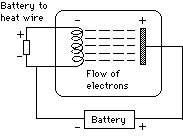History of Computers - Thomas Edison
By Alec Winograd
Thomas Edison (Thomas Alva Edison) was born on February 11, 1847. Edison was an American inventor; one of the most well known inventors of all time. He died on October 18, 1931, but not before he published over 1,000 patents. [1]
Overview
Thomas Edison had very little formal teaching as a child. He was taught reading, writing and math by his mother, though he also taught himself.[2] Edison's first job was working on the Grand Trunk Railway. For saving a station official's son, (in the path of an oncoming train) Edison was taught how to use the telegraph. He then worked as a telegrapher in the Midwest. He invented an telegraph repeating instrument and after it became a huge success, he became a full time inventor. [3]
How the Edison Effect Works
 The air in a bulb is vacuumed out. A metal coil is added to one end of the bulb, and a metal plate to the other. A battery is added below as shown to make the coil negatively charged and the plate positively charged. Another battery must be added behind the coil to make the current flow. The second battery heats the coil, emitting the electrons which are attracted by the positive charge of the metal plate, completeing the current.[4]
The air in a bulb is vacuumed out. A metal coil is added to one end of the bulb, and a metal plate to the other. A battery is added below as shown to make the coil negatively charged and the plate positively charged. Another battery must be added behind the coil to make the current flow. The second battery heats the coil, emitting the electrons which are attracted by the positive charge of the metal plate, completeing the current.[4]
Significance
Edison's had a huge significance in the development of computers. The Edison Effect was discovered by Thomas Edison in 1883 when he added a third electrode to his bulbs. This invention leads to the development of vacuum tubes (History of Computers - Vacuum Tubes) and the transistor.[5] Thomas Edison increased the speed of the computers by discovering the Edison Effect, which showed future inventors how to get computers to use electrical signals to communicate instead of manual switches. If computers had not started using electical signals, the simple task of making a word document would take a long time. [4]
References
- ↑ http://inventors.about.com/library/inventors/bledisonpatents.htm
- ↑ http://inventors.about.com/od/estartinventors/a/Edison_Bio.htm
- ↑ http://www.incwell.com/Biographies/Edison.html
- ↑ 4.0 4.1 http://arc.iki.rssi.ru/mirrors/stern/Education/welect.html
- ↑ http://www.thomasedison.com/Inventions.htm